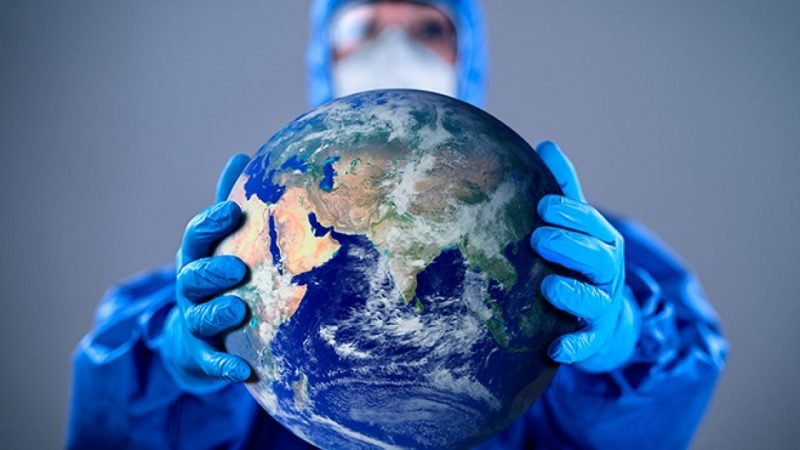Towards a New Climate Order: Metamorphosing Recovery into a Sustainable Future

With the prodigious population forced to stay indoors and industries, schools, offices, transportation services, and probably every other polluting source being closed or limited for a few months, nature has been given its much-needed break. It is understandable to deem that the pandemic infused lockdown has halted the pace of degradation of the environment or may have provided the requisite healing to mitigate the impending climate change for now but in reality, nothing can be more far-fetched. To expect climate change to just attenuate with the post-Covid recovery is simply folly and that too – a colossal one.
It is indeed true that greenhouse gas emissions globally have been reduced by a considerable level in the lockdown and consequently improved the global air quality. But at the same time, we have been so inconsiderate that the newly generated bio-waste in the form of disposable medical kits and PPEs are increasingly found on the shorelines across the world. Not to forget the increased infiltration into the wildlife reserves for poaching and trafficking. We are repealing the progress made on the abolition of disposable plastic bags and infiltrating our environment without even looking for alternatives. With waste disposal and recycling taking a hit in the lockdown period, we can only imagine the consequences.
Truth be told, the pandemic has exposed the shallowness of our multilateral commitments. Contrary to the merry presuppositions of globalization, the world at large became inward-looking and self-seeking. The deeper malaises of the impotent contemporary international order have been exposed to the world. The cruel realizations have pointed out the pre-existing and protracting weaknesses of our politics of Climate change. The impatient citizenry among other major stakeholders is taking note of the situation and is certainly prescribing changes in the global institutional framework to mitigate the fast-approaching climate crisis. To begin with, we need to assess our approach and thoroughly revamp it to conform to the post-Covid developments.

The Pre-Covid approach: More euphemism and less exertion
Climate change is something which we have been experiencing belligerently for the past couple of decades and ‘passively’ postulating about. It is not a non-conventional theory or perspective driven phenomenon or even a lobbying technique against the Industrialists but a well-established fact. Despite all the scientific studies, institutes, and conferences highlighting the warning signs and pestering the world about it, look where we stand today? We are still fighting over what to do. We aren’t even sure as to why we should not use single-use non-recyclable plastic, leave aside the larger intricacies of solving the dependency on fossil fuels. It is not a hidden fact that the designated bodies of Inter-Governmental organizations haven’t fared any better in limiting climate change or even rightfully executing the goals of these very organizations.
The approach has been a hegemonic exercise in totality. The very essence of the struggle has been dismissed outright to suit the political environment of the times. The most affected nations have been limited to annual speeches at the glittery conferences and conventions whereas most causatives have been spearheading the movement displaying their benevolence. Our seriousness on this is indeed startling when you take into account the non-enforceable and practically ‘toothless’ Paris Climate Agreement of 2015 as the most significant event in the fight to reverse Climate change in the past few decades.
So how does the Covid-19 pandemic alter the equations?
The world has now developed a never found consensus that if Covid-19 is a viciously potent, fiercely infectious but detectable virus and still has caused a pandemic resulting in painful deaths of thousands of people among other cruel effects still unfolding then pollution and climate change is its ‘invisible evil twin’ which is silently killing thousands of people annually.
Even before the pandemic, the movement for climate change was at cross-roads, the disgruntled citizenry was nowhere near to getting pacified by the inconsiderate policymakers. The youth has been vital to the development; it is they who are now leading the movement across the world. The failure of the UNFCCC Madrid Conference of the Parties 25 (COP25) to present something distinguishable to pacify the movement has indeed fueled the movement. Moving forward, the memories of the world order collapsing when called upon and the glaring inequalities in access to resources in the times of the pandemic are certainly going to push for a more equitable and sustainable future.

The Post- Covid Approach: Rejuvenating the Movement
The improvements no matter how significant in the health of the Earth as a result of lockdown aren’t sustainable in the long-run. Similar to the 2008 global financial crisis, there is enough evidence to support that as soon as the recovery gains momentum post any crisis, the coming future years are more susceptible to not only a huge spike but also an all-time high figure in terms of carbon emissions. The pandemic has further acted as a ‘poverty multiplier’ with a large proportion of people at a threat to fall back into the vicious cycle of struggle for survival. The pandemic is a reminder of our increased adventurism into realms of the environment. The post-Covid understanding will depend on the strength of our consensus that such a crisis cannot be fought in isolation. This will mark the beginning of our rejuvenated inclusive struggle to annul climate change.
The Table has to turn: Beginning of an Inclusive and Democratic approach
A long-term vision with some short-term targeted stimuli to achieve sustainability is the need of the hour. The recovery has to not only escape the shadow of the futile past arrangements but also to create an enforceable roadmap for the future. For this to happen, we have to negate the power structure of the pre-Covid world as the pandemic has exposed the inability of the international institutions. The world order that failed the world in the wake of the pandemic has to make way for a new equitable order. It is not an improbable idea to expect that the tables will be turned to include the usually neglected developing world but to expect it to continue in the form of nearly a century old hegemonic order is one. The cost of the pandemic is too much; the world has not seen such a crisis in a century and even the mightiest of the mighty have collapsed now.
The redundant binary between the ‘Developed’ and the ‘Developing World’ will be scrapped in the initiation of more responsive, more democratic, and more accountable Inter-Governmental Organizations. Their emergence is certain as the problems of the 21st century cannot be solved by the 20th-century ‘hegemonic’ institutions and that too in a time when the nations would try to become more inward-seeking and less-globalised.
Dawn of a New and Equitable order
New nations are bound to emerge as the leaders of the rejuvenated movement. For nations like- India which has six out of the ten most polluted cities in the world and finds itself amongst the worst sufferers of climate change in the G20, it has the unique opportunity to truly live up to its potential and enforce environmental discipline in the world. It has to play a bigger role in the much anticipated United Nations Framework Convention on Climate Change (UNFCCC) Glasgow COP26 which has now been postponed to 2021. This will mark a watershed moment for the world and serve as a launchpad for our much longer fight.
The impatient and discontented citizenry is closely following the events and nothing less than providing them a voice would be adequate. Climate Change cannot be conquered until and unless the ‘metropole’ and ‘satellite’ relationship between the nations fades away to be replaced by an equitable order with a unique identity to each nation. It will be a big step but a small leap forward in a much longer race to achieve sustainability.

The Path Ahead
The recovery from the pandemic has to forego the traditional modus operandi of economic progress followed by social progress. We cannot afford to misjudge the severity of climate change and pass on the buck to future generations. The quest to reverse it should begin with this very rebuilding.
We have to be ambitious with our targets as the cost of not acting keeps on rising by the day. The world is at a crucial juncture and in deciding how to recover we determine how ready we are for the next crisis. The world has a golden opportunity to check its dysfunctional relationship with nature and to lay the foundation for a new beginning. We have to think beyond sustainability- we have to reverse our excesses.


















